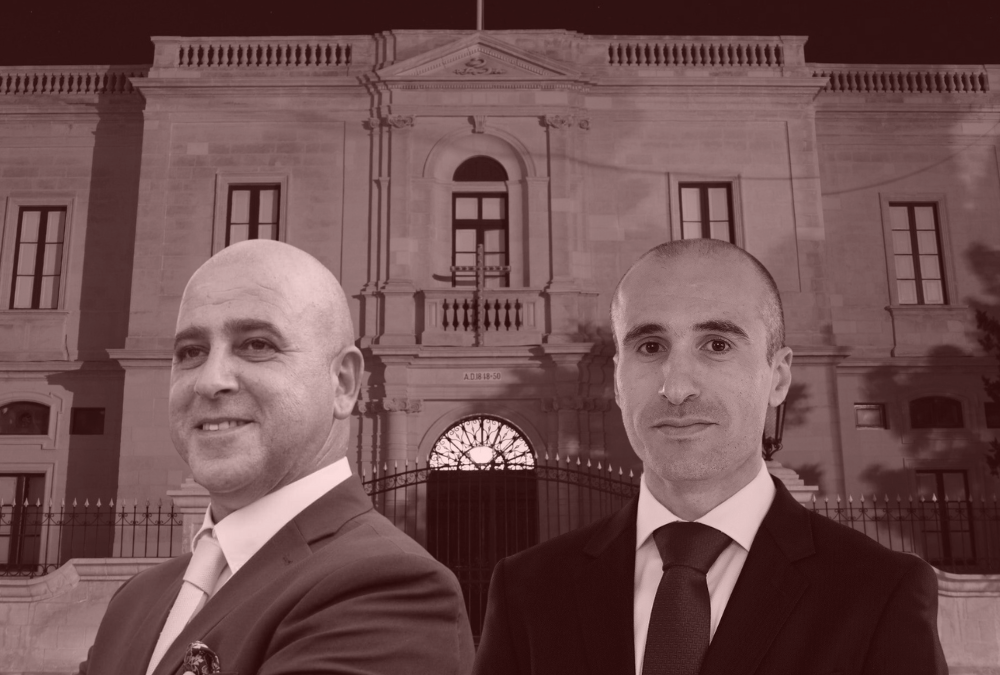This is part two of a broader investigation. Click to read: part one | part two | part three
Senior police inspector Frankie Sammut, who featured in this website’s investigation as the police officer currently selling Maltese passports with disgraced former economy minister Chris Cardona, had instituted court action against police commissioner Angelo Gafa’ over the latter’s imposition of restrictions on what kind of work police officers can do outside of the police force, this website has learned.
Sammut was one of a total of eight police officers (including then-CEO of the police force Angelo Gafa’) who had thrown their hat in the ring for the post of police commissioner when it was last up for grabs in 2020, and was beaten by Gafa’ to the post. At the time, news reports citing senior police sources had described Gafa’ as the government’s favourite candidate.
The court case, which remains ongoing, was initiated through a request for a warrant of prohibitory injunction against the police commissioner’s decision to restrict police officers from carrying out legal work. Besides Sammut, two other police officers initiated the case against Gafa’: Malta’s European Delegated Prosecutor within the auspices of the European Public Prosecutor’s Office in Malta, police superintendent Geoffrey Farrugia, and data protection officer Clayton Silvio.
All three officers had been previously granted permission to perform legal work, albeit with restrictions: according to court documents seen by this website, the officers were only allowed to provide legal advice and assistance in matters that are purely administrative and disciplinary in nature, draft laws, contracts, and conduct related research, provide consultancy services in matters of a civil nature, and give lectures related to their area of expertise.
This restricted permission was granted through an established procedure in which a board, chaired by Gafa’ himself, assessed police officers’ applications for permission to work outside the force on a case-by-case basis.
However, two years after the initial permissions were granted and therefore, after Sammut, Farrugia, and Silvio had already started providing legal services outside of the police force, the commissioner issued an updated version of the policy regulating what kind of work police officers can do which specifically restricted the provision of legal services.
In its preliminary decision about the request for a prohibitory injunction, the court upheld the request from the disgruntled officers, agreeing with their argument that the commissioner’s decision prejudices the time and resources they invested in their legal practices and that they had “legitimate expectations” that they would continue being allowed to do so.
In a scathing response to the application originally filed by Sammut, Farrugia, and Silvio, the police commissioner and the state advocate had rebutted that the decision to further restrict the list of jobs deemed to be “compatible” with the police force had been taken in line with GRECO recommendations from a 2019 report assessing Malta’s rule of law.
While insisting that the police commissioner has wide-ranging discretion over the internal orders issued to the members of the force, the response filed by both Gafa’ and the state advocate also alludes to misconduct from “some” of the applicants.
“It must be said that some of the applicants were caught acting in a professional context which, while in strictu sensu was in line with the permits originally given to them, was effectively done in a flagrant conflict of interest, and with no shame acting against the corps and its interests, which at the end of the day was their employer, and this will be amply proven as the case is heard,” the rebuttal reads.
The response does not go into detail about which of the three officers was “caught” in a flagrant conflict of interest, nor what this conflict of interest consisted of. The case remains ongoing, with the next hearing scheduled for 8 January, 2024.
Following the publication of this website’s investigation about Sammut’s involvement in International World Services Group Ltd (IWS), the company which is partially owned by Chris Cardona, the police force has not responded to questions about Sammut’s apparent conflict of interest as a senior immigration inspector who also moonlights as the head of legal for a firm that sells passport and immigration services, in spite of multiple reminders.
Sammut, Cardona, and their associates at IWS Ltd also did not respond to individual requests for comment from this website. In fact, IWS’ website was taken down shortly after the investigation was published.
A request for comment about Sammut’s conflict of interest was also sent to the Chamber of Advocates. No response was received by the time this article was published.
This is part two of a broader investigation. Click to read: part one | explainer piece
